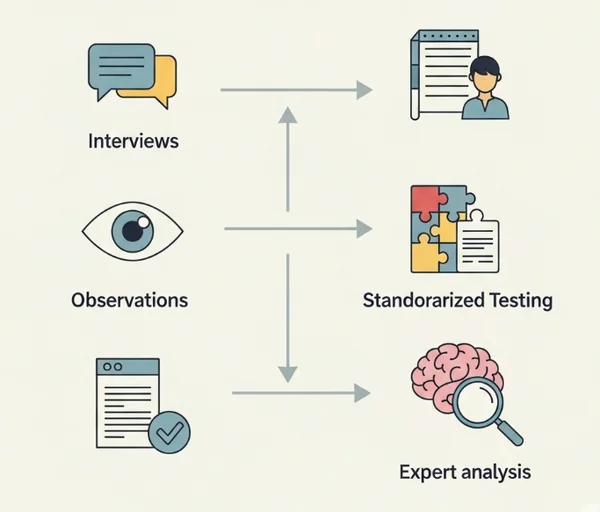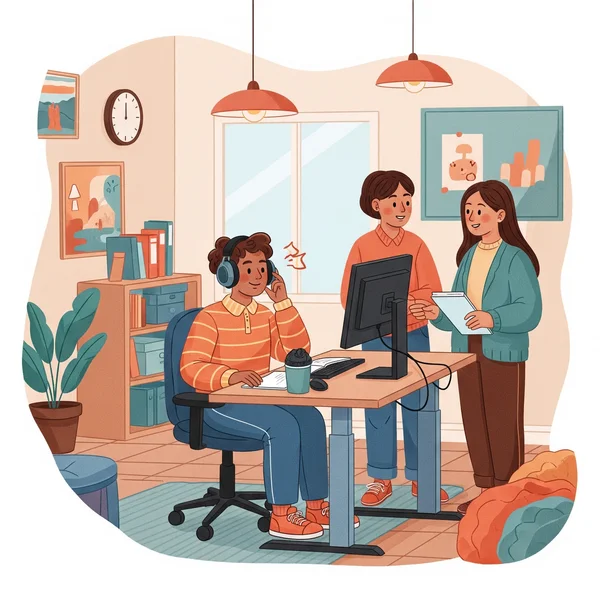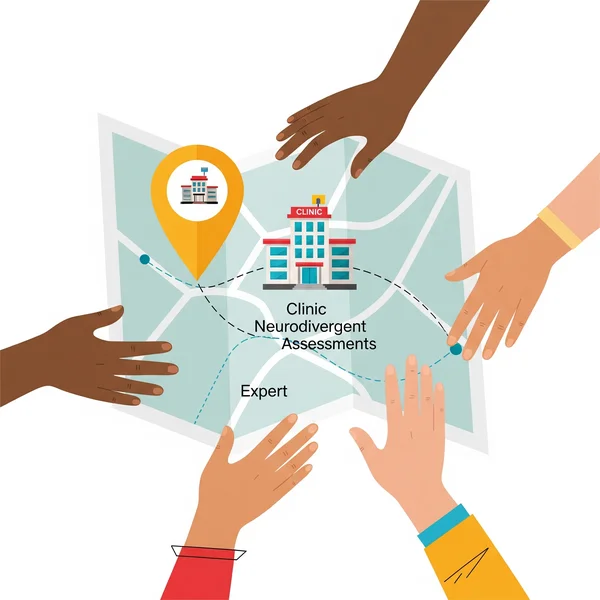Why Professional Neurodivergent Assessment Matters
June 5, 2025 | By Morgan Hayes
While online tools like the Neurodivergent Test and personal self-reflection can be valuable starting points on a journey of understanding, they have significant limitations when it comes to gaining a clear and accurate picture of neurodivergence. So, how to get a neurodivergent assessment and why is it so important? This article will explain why a professional neurodivergent assessment is often a crucial step for accurate understanding, formal importance of diagnosis, and accessing meaningful support.
What is a Professional Neurodivergent Assessment?
Before diving into why it matters, let's clarify what we mean by this term.
A Comprehensive Evaluation by Qualified Experts
A professional neurodivergent assessment is a comprehensive evaluation conducted by qualified and experienced healthcare professionals, such as clinical psychologists, neuropsychologists, developmental pediatricians, or psychiatrists with expertise in neurodevelopmental conditions. It's far more in-depth than any online quiz or self-observation.
Key Components: Interviews, Observations, Standardized Testing
This neurodivergent testing process typically involves several components. These often include detailed clinical interviews (with the individual and sometimes family members), direct behavioral observations, and the administration of standardized, evidence-based tests designed to assess cognitive abilities, academic skills, adaptive functioning, and specific neurodivergent traits (e.g., related to Autism, ADHD, learning disabilities).

More Than Just a Label: Understanding Individual Profiles
A key goal of a professional neurodivergent assessment is not just to assign a label or diagnosis, but to develop a comprehensive understanding of an individual's unique neurocognitive profile. This includes identifying both strengths and challenges, which is crucial for tailoring effective support.
The Limitations of Self-Observation and Online Tools Revisited
Why can't self-observation or online tools replace this formal process?
Why Subjectivity and Lack of Training Fall Short
Self-observation is inherently subjective and can be influenced by personal biases or incomplete information. Similarly, online test limitations neurodivergence are significant; they lack the clinical judgment, training in differential diagnosis, and ability to consider the full context that professionals bring. Understanding the nuances of something like the ados test purpose (Autism Diagnostic Observation Schedule) requires specialized training.
The Dangers of Misdiagnosis or Missed Co-occurring Conditions
Without professional expertise, there are self-diagnosis risks, including misinterpreting traits, potentially misdiagnosing oneself, or, very importantly, missing co-occurring conditions (like anxiety or depression) that might require different or additional support.
Moving from Curiosity (e.g., neurodivergent test online) to Clarity
While an online neurodivergent test can spark curiosity, a professional assessment aims to provide clarity. It moves beyond a simple "maybe" to a more definitive understanding, which is often necessary for peace of mind and practical next steps.
Key Benefits of a Professional Neurodivergent Assessment
Undergoing a formal assessment can offer numerous significant benefits.
Gaining Accurate Diagnostic Clarity (The Importance of Diagnosis)
The foremost benefit is achieving an accurate neurodivergent diagnosis or, conversely, ruling out neurodivergence as the primary explanation for certain experiences. This clarity can be incredibly validating and help individuals make sense of their past and present. The importance of diagnosis cannot be overstated for many.

Understanding Personal Strengths and Challenges
A good assessment doesn't just focus on deficits. It also identifies an individual's unique strengths, talents, and areas where they excel. This balanced perspective is vital for building self-esteem and leveraging abilities.
Informing Personalized Support Strategies
An accurate understanding of one's neurocognitive profile allows for the development of personalized support strategies. This could involve specific educational approaches, workplace accommodations, or therapeutic interventions tailored to the individual's needs.
Validation and Self-Understanding
For many, receiving a formal diagnosis provides profound validation for lifelong experiences that may have been confusing or misunderstood. This understanding neurodivergent profile can be a powerful step towards self-acceptance and a more positive self-identity.
Accuracy and Diagnostic Clarity: Understanding Your Unique Profile
A professional assessment provides a level of detail and accuracy unattainable through other means.
Moving Beyond General Traits to Specific Understanding
While online resources might list general traits, a professional neurodivergent assessment delves into how these traits manifest specifically for an individual, considering their intensity, frequency, and impact on daily life. This provides a much more nuanced understanding neurodivergent profile.
How Professionals Use Diagnostic Criteria (e.g., for ASD, ADHD)
Qualified professionals are trained in using established diagnostic criteria, such as those in the DSM-5 (Diagnostic and Statistical Manual of Mental Disorders), to evaluate for conditions like Autism Spectrum Disorder or ADHD. This ensures a standardized and evidence-based approach.
Understanding the Nuances of Your Neurotype
Neurodivergence is not monolithic. An assessment can help uncover the specific nuances of an individual's neurotype, leading to a richer self-understanding beyond broad labels.
Access to Appropriate Support, Accommodations, and Resources
A formal diagnosis is often the gateway to necessary support.
Unlocking Educational Accommodations (IEPs, 504 Plans)
In educational settings, a diagnosis (e.g., from a psychoeducational evaluation) is typically required to access accommodations like Individualized Education Programs (IEPs) or 504 plans, which provide tailored support for students.
Workplace Adjustments and Support
A formal understanding of one's neurodivergence can help in requesting and receiving reasonable workplace adjustments, fostering a more inclusive and productive work environment. You can learn more about workplace support on our site.

Accessing Specialized Therapies and Interventions
Certain therapies and interventions are designed for specific neurodivergent profiles. An accurate diagnosis ensures that an individual is connected with the most appropriate and effective forms of neurodivergent support access.
Connecting with Relevant Community Resources
A diagnosis can also help individuals and families connect with relevant community support groups, advocacy organizations, and resources specifically for neurodivergent people.
What to Expect During a Neurodivergent Assessment: A General Overview
The prospect of an assessment can feel daunting, so here’s a general idea of the neurodivergent assessment process.
The Initial Consultation and Information Gathering
Typically, the process begins with an initial consultation where you discuss your concerns and reasons for seeking an assessment. The professional will gather background information, including developmental, medical, and educational history.
Types of Tests and Activities Involved (e.g., ADOS test purpose in autism assessments, cognitive tests)
The assessment itself may involve a variety of activities. For suspected autism, this might include observational tools like the ADOS (understanding the ados test purpose is key here). Cognitive tests assess thinking and reasoning skills, while academic tests look at reading, writing, and math. Questionnaires and rating scales might also be used.

The Feedback Session and Report
After the assessment components are completed and scored, you will typically have a feedback session. The professional will discuss the findings, explain any diagnoses, and answer your questions. You should also receive a comprehensive written report detailing the assessment results and recommendations.
Understanding the Psychoeducational Evaluation Process
Often, particularly for children and students, this process is part of a broader psychoeducational evaluation, which looks at learning styles, academic performance, and cognitive processing to inform educational planning.
Differentiating Neurodivergence from Other Conditions
A key role of a professional assessment is to help with differentiating neurodivergence from, or identifying, co-occurring conditions.
Identifying Co-occurring Mental Health Conditions
As discussed in previous articles, neurodivergent individuals may also experience co-occurring mental health conditions like anxiety or depression. A thorough assessment can help identify these and ensure they are appropriately addressed.
Ruling Out Other Explanations for Observed Traits
Sometimes, traits that appear to suggest neurodivergence may be better explained by other factors, such as trauma, medical conditions, or different mental health concerns. A professional can help tease these apart.
The Importance of a Holistic View
Professionals take a holistic view, considering all aspects of an individual's functioning and history to arrive at the most accurate understanding. This is something a simple online neurodivergent test cannot do.
Finding a Qualified Professional for a Neurodivergent Assessment
Knowing how to find neurodivergent specialist is a crucial step.
Types of Professionals Who Can Diagnose (e.g., Psychologists, Neurologists, Psychiatrists)
The types of professionals qualified to conduct these assessments include clinical psychologists (especially those specializing in neuropsychology or developmental disorders), child and adolescent psychiatrists, developmental pediatricians, and sometimes neurologists.
Tips for Finding a Specialist in Your Area
You can start by asking your primary care physician for a referral. Searching online databases of professional organizations (e.g., psychological associations) or specific neurodiversity advocacy groups can also be helpful. Look for providers who explicitly state experience with neurodivergent assessments for your age group.

Questions to Ask Potential Providers
When contacting potential providers, ask about their experience with assessing the specific type of neurodivergence you are concerned about, their assessment process, fees, and whether they accept insurance. Finding a good fit is important.
Investing in Understanding: The Value of Professional Assessment
While the journey to understanding neurodivergence can begin with curiosity and online exploration, for true clarity, accurate diagnosis, and access to meaningful support, a professional neurodivergent assessment is an invaluable investment. It offers a depth of insight that self-observation and informal tools simply cannot provide.
If your exploration through resources like those on NeurodivergentTest.org has led to significant questions or concerns about yourself or a loved one, consider discussing the possibility of a professional assessment with a trusted healthcare provider. It is often the most reliable path toward genuine understanding and empowerment.
Your Questions About Professional Neurodivergent Assessments
How long does a neurodivergent assessment usually take?
The duration varies depending on the complexity and the specific tests administered but often involves several hours spread across multiple appointments. This includes interviews, direct testing, and a feedback session.
Is a professional assessment expensive? Are there affordable options?
Costs can vary significantly based on the provider, location, and comprehensiveness of the assessment. Some insurance plans may cover part of the cost. It's worth researching community mental health clinics, university training clinics, or sliding scale providers for potentially more affordable options.
What kind of professional conducts a neurodivergent assessment?
Typically, clinical psychologists (especially neuropsychologists), developmental pediatricians, or child/adolescent psychiatrists are qualified. Ensure they have specific experience in assessing neurodevelopmental conditions in the relevant age group.
Do I need a referral from a doctor to get an assessment?
This depends on your location and insurance plan. Some providers or insurance companies may require a referral from a primary care physician, while others allow self-referral. It's best to check with potential assessment providers and your insurance.
What if the assessment doesn't confirm neurodivergence? What then?
An assessment provides valuable information regardless of the outcome. If neurodivergence isn't confirmed, the assessment may identify other reasons for your experiences or challenges, and the professional can provide recommendations for different types of support or further investigation if needed. The goal is always greater understanding. You can find more information about navigating your journey on our website.